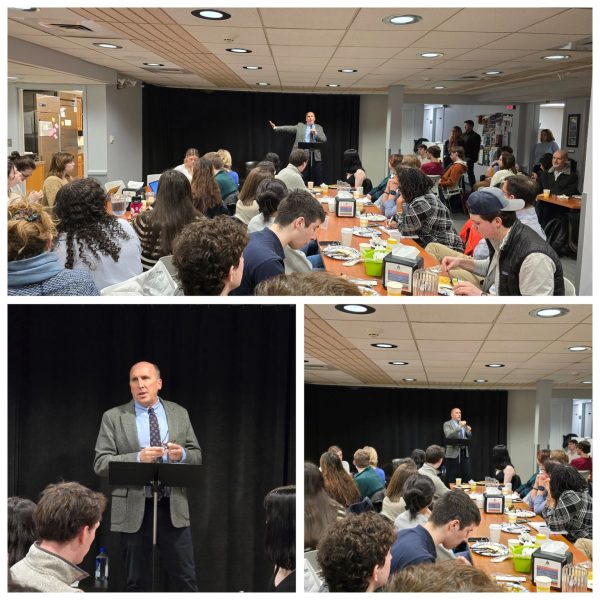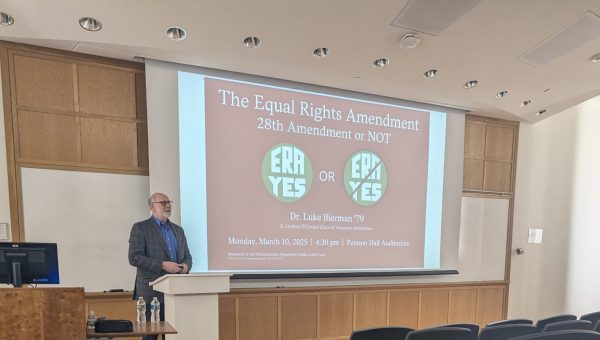Visiting Speaker Michael O’Hanlon Discusses Potential for War Between US and China
Colgate University’s Lampert Institute for Civic and Global Affairs brought Michael O’Hanlon to present “Destined for War: the US and China,” a talk on the current relationship between the United States and China. The talk, held on Tuesday, April 11 in Persson Auditorium, discussed the potential for future conflict between the two states. O’Hanlon is the Director of Research and Foreign Policy at the Brookings Institution, a non-resident scholar at the Lampert Institute and a member of the Defense Policy Board at the U.S. State Department.
O’Hanlon discussed the nuances of changing economic trends between the U.S. and China, as well as China’s spotty human rights record. He also talked about Taiwan, Chinese incursions in the South China Sea, the Chinese military and nuclear competition, emphasizing the declining American view of China.
“In the United States, I start to hear more and more people talking about China as our adversary, that’s often a term you hear at the Pentagon — [although] it’s not a term that official Pentagon documents include,” O’Hanlon said. “[The Pentagon] went out of their way to […] call China the ‘pacing challenge’ […], and they call Russia the ‘acute threat,’ but they prioritize China over Russia in our military planning.”
O’Hanlon began the talk by emphasizing the importance of the subject, especially the implications of U.S.-China relations for the future of international relations more broadly.
“This question of the United States’ relationship with China could be the most important single thing in [this generation’s] lives,” O’Hanlon said. “In other words, there’s no bigger issue than this.”
O’Hanlon covered a wide swath of metrics comparing the United States and China’s social and economic prowess, narrowing in on what areas are the most concerningly competitive. To illustrate the magnanimity of the growing U.S.-China rivalry, O’Hanlon used Graham Allison’s classic “Thucydides Trap.” O’Hanlon discussed Allison’s research — as well as flaws in his methodology — and applied the theory to the two countries.
“Thucydides explained the outbreak of war,” O’Hanlon said. “Out of that [explanation] came the question: is it inevitable that when one established superpower is challenged by the emergence on the scene of another, that you just inherently have a conflict brewing?”
He continued, explaining how rhetoric around global strength and public perceptions of dominance play into potential U.S.-China clashes.
“[America is] getting nervous about how powerful [China is] becoming, and [China is] feeling a little bit like it’s their moment to come back and have their place in the sun,” O’Hanlon said. “[China calls] themself the ‘middle kingdom,’ we think of ourselves as ‘the shining city on a hill’ — these are two pretty powerful, proud energized peoples and two pretty ambitious sets of foreign policy worldviews, so it’s sort of natural they’d bump into each other.”
Sophomore Angie Ramirez agreed that there is a potential for the U.S. and China to fall into Thucydide’s trap, agreeing with O’Hanlon’s assertions.
“China and the U.S. are bound to have conflict, as China’s economic and political power is only increasing with time,” Ramirez said.
Beyond the inevitability of war, some questioned the point of global aggression. Sophomore Emilia Bennett had sharp words regarding the potential for future conflict between the U.S. and China.
“I think war is deplorable and we should stop doing it,” Bennett said. “What do [the U.S. and China] think they’re going to accomplish?”

LJ Coady is a senior from Houston, Texas, concentrating in political science with a minor in religion. She has previously served as Head Editor of the...








